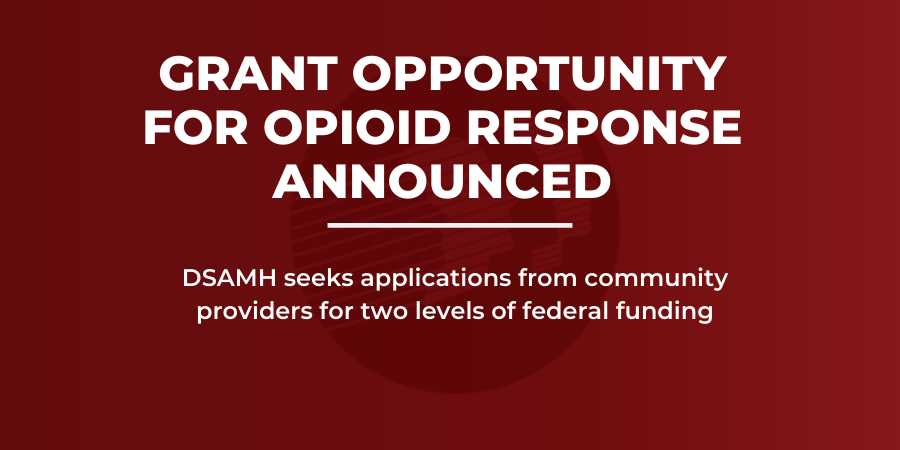DHSS Announces Community Grant Opportunity to Respond to Opioid Crisis
Delaware Health and Social Services | Newsroom | Date Posted: Monday, May 24, 2021
Delaware Health and Social Services | Newsroom | Date Posted: Monday, May 24, 2021

NEW CASTLE (May 24, 2021) – The Division of Substance Abuse and Mental Health (DSAMH) and the Opioid Response Team are announcing community grant funding opportunities through DSAMH’s federal State Opioid Response (SOR) grant.
Through the grant program, DSAMH will fund eligible providers to:
“We know that some of the best and most innovative responses to Delaware’s opioid crisis come from the providers who are closest to individuals and families impacted by this crisis,” said Department of Health and Social Services (DHSS) Secretary Molly Magarik. “We encourage providers of all sizes to review the requirements and apply for this important community funding.”
The grants are provided through DSAMH’s State Opioid Response (SOR) grant, funded by the U.S. Substance Abuse and Mental Health Services Administration (SAMHSA). For the first round of funding, grant applications are due on June 14, 2021, and funded projects may begin as early as July 1, 2021. Projects can vary in length, but the final deadline for completion will be September 2022.
Prospective applications also are encouraged to register to attend a virtual technical assistance webinar: 5-6 p.m. Tuesday, May 25; register here:
https://healthmanagement.zoom.us/meeting/register/tJAvd-yppj4sHdAlqZhKhXgQyQ_nwgRh1Hu_
The grant application is available on the DSAMH website:
https://www.dhss.delaware.gov/dhss/dsamh/startexp.html. Final applications can be emailed to DSAMH.ORT@delaware.gov
Providers who previously applied for Tier 1 funding to implement universal screening are eligible and encouraged to apply for these community grants.
In 2019, the Delaware Division of Forensic Science reported 431 overdose deaths in Delaware, an increase of almost 8% over 2018. The 2020 report has not been issued. Of the 431 total deaths in 2019, the Division reported that 341 (79%) involved fentanyl, a synthetic pain reliever that is 50-100 times more potent than morphine. The percentage of total cases in 2019 involving fentanyl was 5 percentage points higher than in 2018.
Delawareans who are suffering from substance use disorder can call DSAMH’s 24/7 Delaware Hope Line to be connected to treatment services at 1-833-9-HOPEDE or 1-833-946-7333. Or they can visit DHSS’ one-stop website, HelpIsHereDE.com.
-30-
The Department of Health and Social Services is committed to improving the quality of life of Delaware’s citizens by promoting health and well-being, fostering self-sufficiency, and protecting vulnerable populations.
Keep up to date by receiving a daily digest email, around noon, of current news release posts from state agencies on news.delaware.gov.
Here you can subscribe to future news updates.
Delaware Health and Social Services | Newsroom | Date Posted: Monday, May 24, 2021

NEW CASTLE (May 24, 2021) – The Division of Substance Abuse and Mental Health (DSAMH) and the Opioid Response Team are announcing community grant funding opportunities through DSAMH’s federal State Opioid Response (SOR) grant.
Through the grant program, DSAMH will fund eligible providers to:
“We know that some of the best and most innovative responses to Delaware’s opioid crisis come from the providers who are closest to individuals and families impacted by this crisis,” said Department of Health and Social Services (DHSS) Secretary Molly Magarik. “We encourage providers of all sizes to review the requirements and apply for this important community funding.”
The grants are provided through DSAMH’s State Opioid Response (SOR) grant, funded by the U.S. Substance Abuse and Mental Health Services Administration (SAMHSA). For the first round of funding, grant applications are due on June 14, 2021, and funded projects may begin as early as July 1, 2021. Projects can vary in length, but the final deadline for completion will be September 2022.
Prospective applications also are encouraged to register to attend a virtual technical assistance webinar: 5-6 p.m. Tuesday, May 25; register here:
https://healthmanagement.zoom.us/meeting/register/tJAvd-yppj4sHdAlqZhKhXgQyQ_nwgRh1Hu_
The grant application is available on the DSAMH website:
https://www.dhss.delaware.gov/dhss/dsamh/startexp.html. Final applications can be emailed to DSAMH.ORT@delaware.gov
Providers who previously applied for Tier 1 funding to implement universal screening are eligible and encouraged to apply for these community grants.
In 2019, the Delaware Division of Forensic Science reported 431 overdose deaths in Delaware, an increase of almost 8% over 2018. The 2020 report has not been issued. Of the 431 total deaths in 2019, the Division reported that 341 (79%) involved fentanyl, a synthetic pain reliever that is 50-100 times more potent than morphine. The percentage of total cases in 2019 involving fentanyl was 5 percentage points higher than in 2018.
Delawareans who are suffering from substance use disorder can call DSAMH’s 24/7 Delaware Hope Line to be connected to treatment services at 1-833-9-HOPEDE or 1-833-946-7333. Or they can visit DHSS’ one-stop website, HelpIsHereDE.com.
-30-
The Department of Health and Social Services is committed to improving the quality of life of Delaware’s citizens by promoting health and well-being, fostering self-sufficiency, and protecting vulnerable populations.
Keep up to date by receiving a daily digest email, around noon, of current news release posts from state agencies on news.delaware.gov.
Here you can subscribe to future news updates.